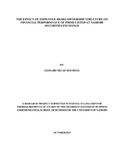| dc.description.abstract | The objective of this study was to determine the effect of employee share ownership structure on financial performance of firms listed at the Nairobi Securities Exchange in Kenya. The research used a descriptive survey research design. The descriptive survey was ideal because it ensured thorough description of the situation ensuring least possible bias in data collection. The study made use of secondary data collected from annual reports submitted to the CMA for the target population comprised of all listed companies who have adopted ESO. Summaries of data findings together with their possible interpretations were presented using tables, charts, correlations, standard deviations and regression. The study found out that mean of ESO ratio is relatively high as compared to other variables. The ESO ratio also had the highest standard deviation. The Foreign ownership had the highest correlation with the performance followed by ESO. From the regression equation the study concluded that a unit increase in ESO, Foreign ownership and firm size would lead to improvement on the financial performance of companies listed at NSE. Therefore; the study recommends that; ESO should always be taken in to account to improve the performance of listed companies as measured by return on assets. Policy makers should also undertake to understand the impact of employee and management ownership in the performance of firms listed at NSE. | en_US |

